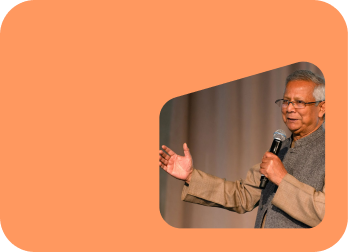At the 17th Microcredit Summit in Merida, Mexico, Grameen Foundation President Alex Counts and Senior Program Specialist Frank Ballard interviewed Professor Muhammad Yunus, a founding member of Grameen Foundation's board of directors. He spoke extensively about the growing impact of social businesses globally and offered important words of advice to young people. Excerpts appear below.
Grameen Foundation: Professor Yunus, tell us about your recent travels and work.
Professor Muhammad Yunus: I’ve been involved in a number of social business initiatives in many countries through Yunus Social Business (YSB). One very exciting initiative took place at the beginning of [2014] in Tunisia. There, YSB’s local office launched a business design competition, announcing it in the newspaper and putting it up on their website. They would select the best idea and invest in it. They gave just one month to submit ideas and expected only 100 submissions from the entire country—they received over 2,300 business plans. Twelve of these were shortlisted, and I was invited to a workshop to help guide them in selecting the best six out of twelve.
I’ve also been active in Colombia, where the coffee market has been waning as companies that grew coffee in Colombia have moved elsewhere. Farmers there are struggling to find new profitable crops to invest in. Governor of Caldas province went to Cartagena to meet me and request me to help the poor farmers in his state.
I took it up seriously. We launched social business initiatives in Colombia through YSB. McCain Foods, the world’s largest producer of french fries, told me that they were interested in social business. So we saw a perfect fit in Colombia. We initiated a joint venture with McCain. We named it Campo Vivo. Now through Campo Vivo farm workers who were sitting idly are transformed into independent farmers and have begun growing potatoes. Campo Vivo (CV) is a joint venture social business company. It is supplying the farmers with all they need, including land, and promise a 50% higher yield for the potatoes than in the rest of Colombia. They are also providing the farmer with training and hopefully will offer them insurance soon. The farmers share part of their harvest with CV and sell the rest on the market. About 60% of the yield will be turned into french fries. When this becomes a success with potatoes, we will move into other crops.
At the Yunus Centre’s Social Business Design Lab in Bangladesh, we are trying to instill in individuals, especially youth, that they are job creators, not job seekers. There, we have 10 to 15 business plans proposed each week. It’s very exciting because people come up with beautiful ideas. Some of the young entrepreneurs are illiterate. Many are dropouts, but we also get people with MBAs. We’re using mobile technology to keep track of the businesses we choose. Every day young people whose ideas we invest in have to report five pieces of basic business information, such as expenses and sales, through SMS. Many of these young people hadn't ever sent an SMS before joining our programme. The data that’s sent go to a central server and provide us with a complete picture of whether sales are up or down. We’re recording the history of many tiny companies through this process.
We had an illiterate person who presented a business plan to us recently. He gave us a long presentation about his idea. At the end I asked, “Did you write this down?” He told me he memorized the whole thing. I encouraged him, saying that if he can memorize such a long presentation, he can learn to read very easily. It’s a question of your mind and what you want to do with it. We selected his idea, and I told him that he needed to send those five primary data I mentioned earlier, through SMS, and our support was contingent on his doing so. He readily agreed.
We’re also trying to implement an idea lab in Sweden. You know my favorite thing is getting healthcare to people. I'm trying to get diagnostic services basically free of cost to people over mobile phones with the goal of doctorless healthcare. We have a few Swedish companies who are interested. My thought is that we don't always need physical presence of doctors. We can feed all the body information into a computer, and the software can give us, say, three options for what problem you may have. Then you have three tests to undergo in order to rule out what you don’t have, and the computer then tells you what you need to do to get better. We envision people wearing a wearable bracelet that feeds health data continuously to a server. That would become a big tool for prevention. You can have mobile app that, instead of simply giving you a weather report, tells you, “Today, eat less sugar.”
We’re also working on education. There's no reason why anyone today should be illiterate. We can make learning interesting for kids. First, we can communicate with pictures and then move on to writing. A Swedish company is working with us to develop a game for mobile phones to help children and illiterate adults to read and write. When the developers visited us in Bangladesh, they were amazed by Grameen Telecom’s own brand of smartphones because they were so beautiful and cheap. Those phones are produced in China and sold for just $40. The developers enjoyed them so much that they bought multiples of them as gifts to take home to Sweden. Phones don’t need to be expensive to be good.
We’re also now talking about building a bicycle factory in Bangladesh. A Swiss bike enthusiast came to me with this idea. He saw that there were lots of bikes in Bangladesh—that it was the main form of transportation—but the bikes in Bangladesh are heavy and old fashioned. Bicycle technology has changed so much. I liked the idea and encouraged it.
He started studying the types of bikes Bangladeshis were buying. Today the cost is 8,000 taka [US $103] to 250,000 taka [US $3,230]. If you want a decent bike, it’ll cost between 10 and 15,000 taka [US $129 to $194]. There are so many fancy bikes with fancy gadgets. However, we decided that we could build useful bikes that don't have all these accessories. He talked about pedal-less bikes. Riders can use them to ride and walk. They even help learn how to ride, and get used to bikes. The entrepreneur wants to produce these pedal-less bikes too because they're so inexpensive to build, essentially they’re just two wheels and a bar. To try them out, we wanted to give them to an all-girl school so that the girls could have a bike to ride to and from home. They can carry their books on the bike and, because the bikes will be so light, the girls can carry them if needed.
In villages in Bangladesh, people don't like for girls to ride bikes, but people need to get used to girls riding them! As an experiment we are producing 10 pedal-less bikes and taking them to the girls school to see if the girls are willing to rent them for a dime-a-day.
GF: The 17th Microcredit Credit Summit is all about innovation. Have you seen any new ideas that you really like?
MY: The one big idea is technology, but it needs a stronger push. We can apply IT in banking very easily. We shouldn’t be carrying cash back and forth. In Bangladesh, people still mostly depend on cash, though mobile money transfers are getting popular. Every shop in a village market is sort of a bank because they provide cash transfers with a mobile phone. We’re seeing this movement happening now.
GF: Interns are so important to the work we do. What messages do you have for them?
MY: Young people are lucky to be part of this generation because there’s so much opportunity that didn't exist before. When I was young, we had to write letters by hand, send them via post office, and wait months for a response. Social media is changing everything—it expands our social circles and gives us more capacity. People today are really “superman” because of technology. Everyone should find out how to become Superman because each of us has the capacity to change the world. We must use that capacity. Imagine the world you want, and it will happen.
I’d also like to tell young people today not to be a job seeker, but rather a job creator. Young people limit themselves so much when they merely think of themselves as job -seekers. People are doers and creators; just leave them alone and allow them to grow. Our schools do damage by telling everyone to work hard to get a job. We prepare children to be job seekers. Today we have high unemployment, but it doesn't make sense to have unemployment. Unemployment means unutilized; but I can use myself. I wasn't born to be used by someone else. I'm not a slave, and no one should wait for someone else to come forward to use him.


 SOCIAL BUSINESS
SOCIAL BUSINESS 

 Events
Events News
News



